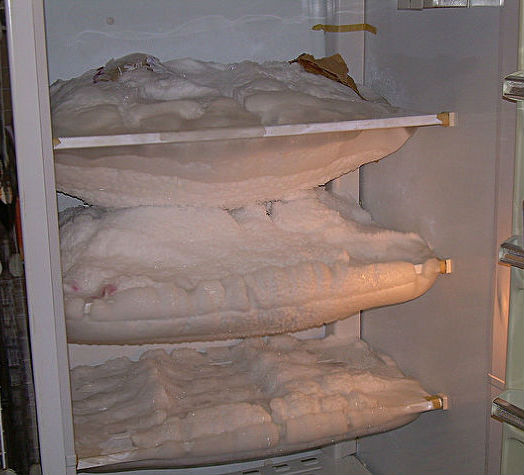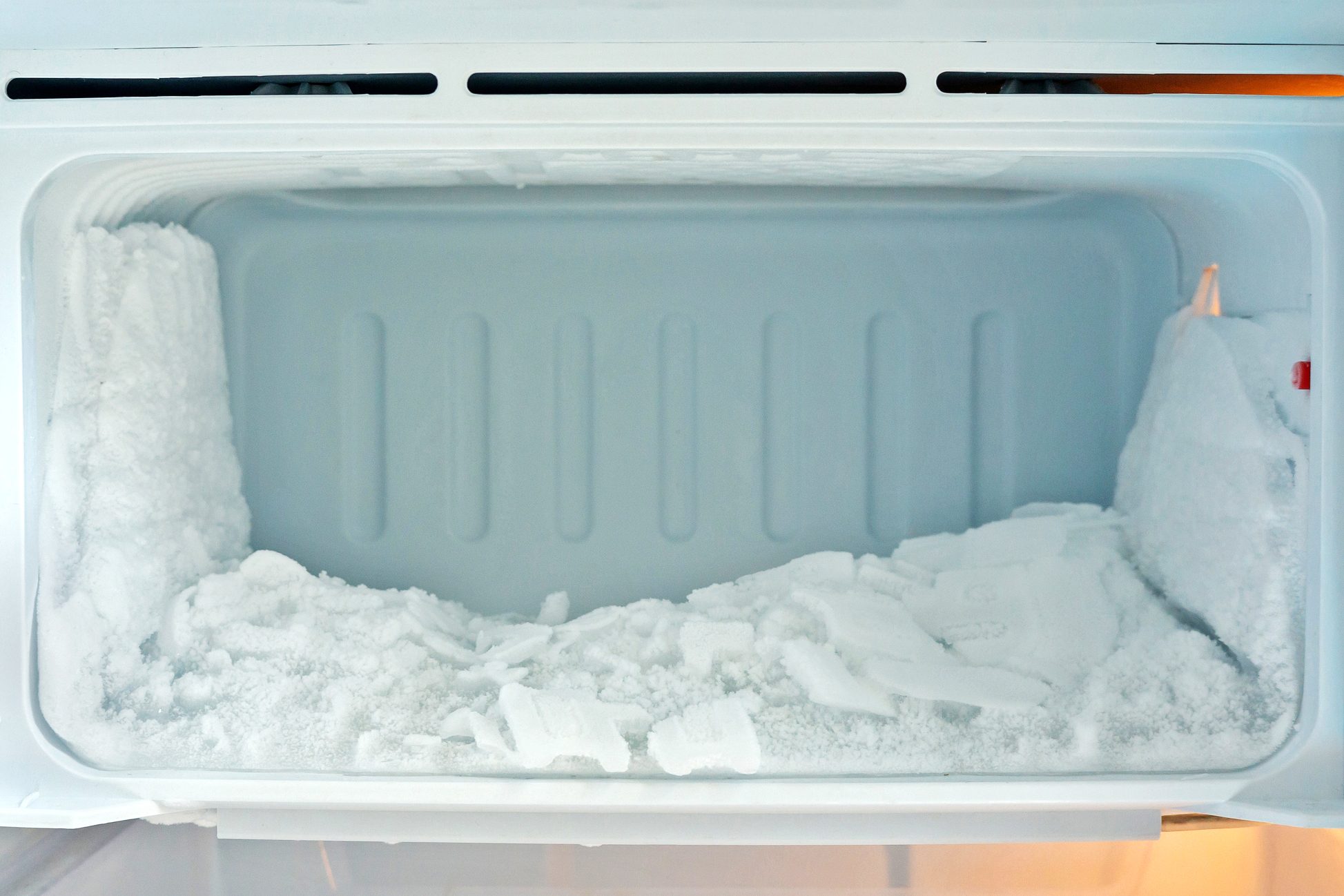Frost builds up in your freezer due to moisture exposure and poor sealing. This can lead to inefficient cooling and spoilage.
A frosty freezer can be frustrating and may indicate underlying issues. Understanding why frost accumulates is essential for maintaining optimal appliance performance. Excess moisture often enters through improperly sealed doors or vents. Frequent opening of the freezer also contributes to humidity levels rising inside.
Additionally, a malfunctioning defrost heater can lead to frost build-up. Regular maintenance and monitoring of your freezer can prevent these issues. By addressing the root causes of frost, you can ensure your freezer operates efficiently and prolong its lifespan. Keeping your freezer frost-free not only saves energy but also protects your food quality.

Credit: www.youtube.com
The Cold, Hard Truth About Freezer Frost
Frost in your freezer can be annoying. It usually forms due to humidity inside the freezer. Warm air enters when the door opens. This causes moisture to freeze and form frost.
Several factors contribute to frost buildup:
| Factor | Description |
|---|---|
| Temperature | Higher temperatures can lead to frost formation. |
| Door Seal | A damaged seal allows warm air to enter. |
| Food Placement | Blocking air vents can trap moisture. |
| Frequent Opening | Opening the door often introduces warm air. |
Keeping your freezer organized can help reduce frost. Ensure the door seals tightly after each use. Regularly check for frost and remove it as needed.

Credit: www.networx.com
Common Misconceptions About Freezer Frost
Many people think frost-free freezers do not get frost at all. This is a common myth. Frost-free means the freezer has a fan to keep air moving. It does not mean frost cannot form.
Overstocking your freezer can also cause problems. Air circulation is very important. When items block airflow, frost can build up. Always leave space between items for proper air movement.
Seals And Gaskets: The First Line Of Defense
Damaged seals and gaskets can cause frost in your freezer. They allow warm air to enter, which leads to moisture buildup. This moisture freezes, creating frost. Regularly check seals for cracks or tears. Replace any damaged gaskets immediately to prevent frost.
To maintain a frost-free freezer, keep it organized. Avoid overpacking, as this restricts air circulation. Ensure the door closes tightly after use. Clean the seals regularly with warm, soapy water to remove dirt.
Consider setting the temperature between -5°F and 0°F for optimal performance. Monitor the temperature regularly to ensure it stays consistent. These simple steps can help keep your freezer frost-free.
Temperature Turbulence: Finding The Sweet Spot
Freezer frost can be a real problem. Thermostat settings play a huge role in this issue. Keeping your freezer at the right temperature is important. A setting between 0°F and 5°F is ideal. Too cold or too warm can cause frost buildup.
External temperatures can also affect your freezer. Warm air enters when the door opens. This can lead to moisture buildup. If your kitchen is hot, your freezer works harder. This can create more frost inside.
Regular maintenance helps prevent frost. Check the door seals for any gaps. Clean the condenser coils to improve airflow. Keeping your freezer organized can also help. Avoid overloading it to ensure proper circulation.
The Open Door Dilemma
Leaving the freezer door open causes cold air to escape. This leads to frost buildup inside. Frequent access can raise the freezer’s temperature. When it gets warmer, moisture forms and freezes. This makes it harder to keep food frozen.
Educating family members is key to avoiding frost. Teach them to close the door quickly. Encourage them to take out everything they need at once. Make sure they know the importance of checking the door seal. A tight seal helps keep the cold in.
Using clear labels can also help. Label different sections of the freezer. This makes it easier to find items quickly. A well-organized freezer reduces the time the door stays open.

Credit: www.familyhandyman.com
Humidity And Frost: An Inevitable Duo
Freezers are often affected by humidity. Ambient moisture enters the freezer when the door opens. Warm air condenses and creates frost. This frost builds up over time. It can affect the freezer’s efficiency.
Controlling humidity levels helps reduce frost. Ensure the freezer door seals tightly. Avoid leaving the door open for long. Regularly check the door gasket for wear and tear.
Using containers can help. Store food in airtight bags. This limits moisture from escaping. A dehumidifier can also assist in reducing overall humidity in the area.
Defrosting Do’s And Don’ts
Defrosting your freezer can be easy with the right methods. Use a hairdryer on a low setting. This will help melt the frost quickly. Another option is to place a bowl of hot water inside. The steam will loosen the ice. Always keep a towel handy to catch melting water.
Avoid using sharp tools like knives. This can damage your freezer’s interior. Never leave the freezer unplugged for too long. Food can spoil quickly. Wait for the frost to melt naturally, but don’t let it build up too much.
| Common Mistakes | Impact |
|---|---|
| Using sharp objects | Damages freezer |
| Not catching water | Causes mess |
| Defrosting too often | Wastes energy |
Innovations In Frost Management
Frost management has seen amazing innovations in recent years. New designs help reduce frost buildup. Frost-free appliances use advanced technology to keep freezers clear. They circulate air evenly to prevent frost. This keeps food fresh and safe.
Some models have special sensors. These sensors detect temperature changes. They adjust cooling automatically, preventing frost. Other designs feature improved insulation. This helps maintain a consistent temperature.
| Frost-Free Features | Benefits |
|---|---|
| Auto Defrost | Eliminates manual defrosting |
| Even Air Circulation | Prevents ice buildup |
| Temperature Sensors | Maintains optimal conditions |
Choosing a frost-free appliance offers many advantages. It can save time and effort. Think about your storage needs and lifestyle. A frost-free model may be the best choice.
Preventive Measures For Prolonged Appliance Health
Regular routine checks can help keep your freezer in good shape. Check the door seals to ensure they close tightly. Look for any frost buildup inside. This can indicate a problem.
Cleaning the coils on the back or bottom helps with airflow. A clean unit runs more efficiently. Schedule professional maintenance at least once a year. Experts can spot issues early.
They can also offer advice on best practices. Keeping your freezer well-maintained saves energy. It also prolongs the life of your appliance.
When To Call A Professional: Beyond Diy
Frost in your freezer may signal a problem. Identifying serious issues early can save money. Look for unusual sounds or temperatures. Excessive frost buildup can mean a broken seal. Check the door for proper closure.
Finding a trusted appliance repair service is essential. Ask friends or family for recommendations. Online reviews can help you find reliable options. Verify the technician’s credentials before hiring. A good service will offer a warranty on repairs.
Frequently Asked Questions
How Do I Stop My Freezer From Getting Frost?
To stop your freezer from getting frost, keep the door closed tightly. Ensure the door seals are clean and intact. Avoid placing hot food inside. Set the temperature correctly, ideally between 0°F and -10°F. Regularly defrost your freezer to maintain efficiency and prevent ice buildup.
How Do You Fix A Frosted Freezer?
To fix a frosted freezer, unplug the appliance and allow it to defrost. Remove food items and clean any debris. Check the door seal for damage. Ensure proper airflow by not overcrowding the freezer. Plug it back in and monitor for consistent temperatures.
Why Does My Freezer Have Frost All Of A Sudden?
Frost buildup in your freezer can occur due to a damaged door seal. Warm air enters, causing condensation. A malfunctioning defrost timer or heater can also lead to frost. Regularly check for food spills and ensure proper airflow. Cleaning and maintenance can prevent future frost issues.
Will Frost In Freezer Go Away On Its Own?
Frost in the freezer does not go away on its own. It builds up over time and can affect efficiency. Regular defrosting helps maintain optimal performance. Consider cleaning your freezer periodically to prevent excessive frost accumulation.
Conclusion
Frost in your freezer can be a nuisance. Understanding its causes helps you tackle the problem effectively. Regular maintenance and checking seals can prevent frost build-up. By staying proactive, you can keep your freezer efficient and your food fresh. Take these steps to enjoy a frost-free experience in your kitchen.
